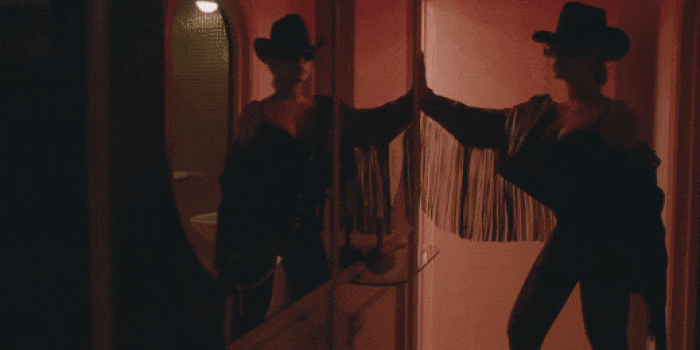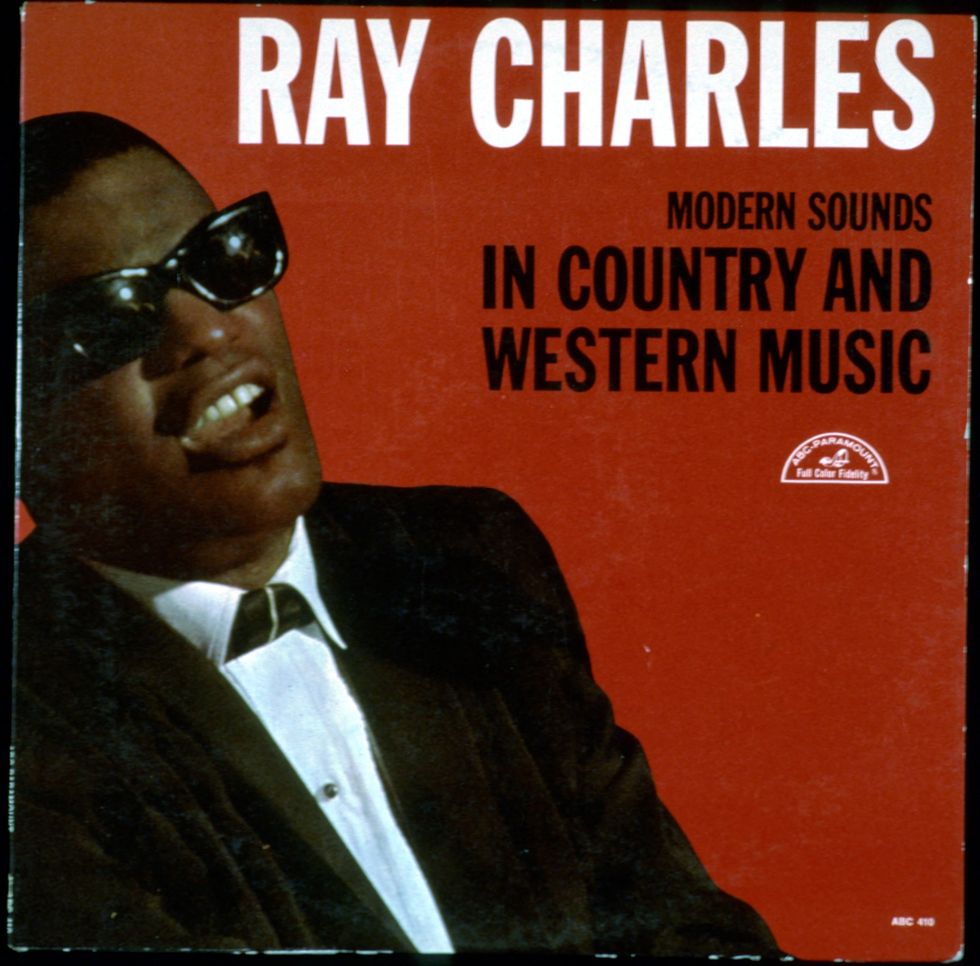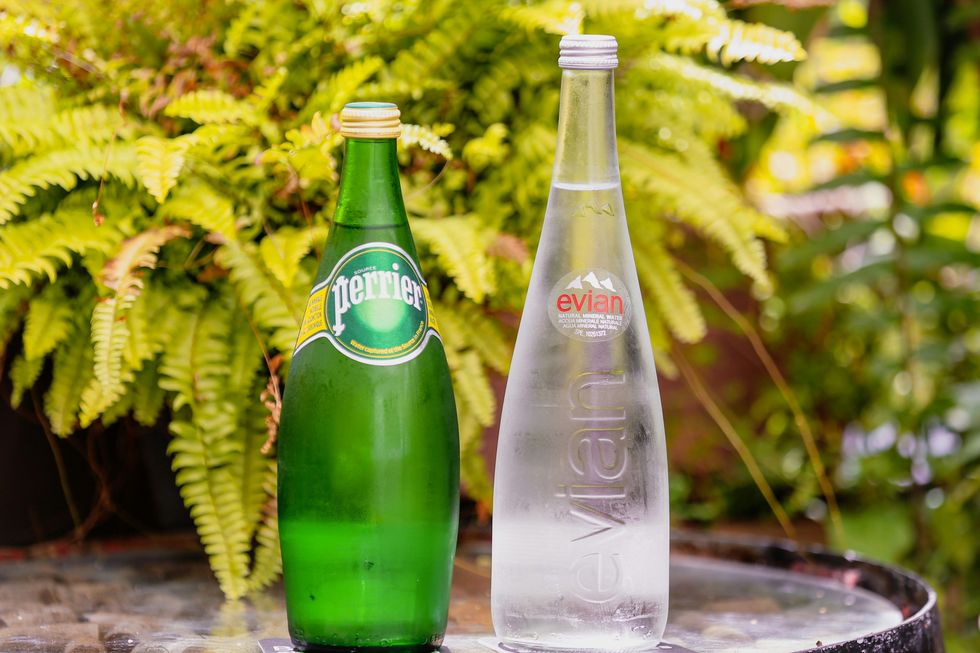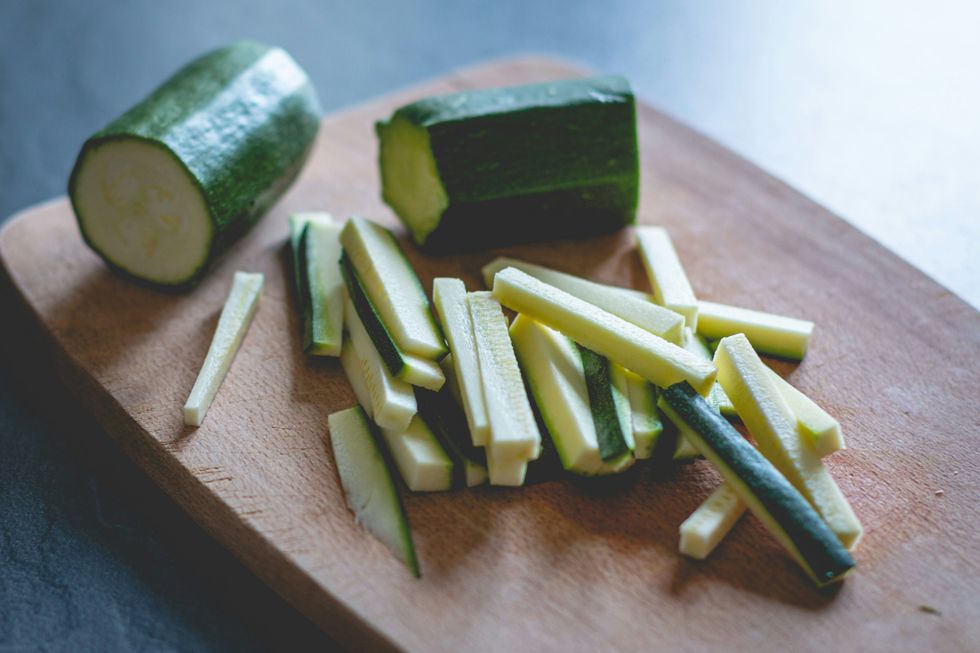Beyoncé's 'COWBOY CARTER' Pays Homage To Our Roots & Dares Us To Exist In Any Space We Choose

Super Bowl Sunday Queen Bey struck again, snatching all our edges and keeping us in the same chokehold we’ve been in for the past couple of decades. After her Verizon commercial, where she alluded to her power to break the internet, Beyoncé essentially broke the internet with her announcement that Renaissance Act II would be released on March 29, 2024 (aptly titled COWBOY CARTER, we'd later learn) The final drop in this marketing masterpiece was the release of two new singles, “16 CARRIAGES” and “TEXAS HOLD ‘EM,” which have both soared to number one and two in the iTunes country music category.
However, despite the pure excitement by the BeyHive to follow Beyoncé wherever she leads them, there has already been pushback in the country music arena to deny the Queen access. Oklahoma station KYKC 100.1 FM denied a listener's request to hear Beyoncé’s new songs on its station because “We do not play Beyoncé' [sic] as we are a country music station," it responded via email.
This isn’t the first time Beyoncé has been dismissed in the genre. In 2016, when she released "Daddy’s Lessons" on Lemonade, she not only was met with backlash from country music fans but was also denied by the Recording Academy’s Country Committee after she submitted the record for a Grammy. In a March 19 update posted to Instagram, she alluded to that time as being the catalyst for her next body of work, saying she "did not feel welcomed" in that space, and that the forthcoming COWBOY CARTER was born from her experience of being excluded.
Beyoncé wrote, "This album has been over five years in the making. It was born out of an experience that I had years ago where I did not feel welcomed…and it was very clear that I wasn’t. But, because of that experience, I did a deeper dive into the history of Country music and studied our rich musical archive. It feels good to see how music can unite so many people around the world, while also amplifying the voices of some of the people who have dedicated so much of their lives educating on our musical history."

Beyoncé (2nd R) performs onstage with Emily Robison, Natalie Maines, and Martie Maguire of Dixie Chicks at the 50th annual CMA Awards in 2016.
Rick Diamond/Getty Images
She continued, "The criticisms I faced when I first entered this genre forced me to propel past the limitations that were put on me. act ii is a result of challenging myself, and taking my time to bend and blend genres together to create this body of work."
We saw a similar response to Lil Nas X’s "Old Town Road" in 2019 when the original single was removed from the Billboard Country charts because it didn’t “embrace enough elements of today’s country music.” Lil Nas X went on to win a Grammy with Billy Ray Cyrus for the song’s music video but was only accepted into the category after Cyrus joined for the remix.
Though the origins of the country music genre are an extension of Black culture and African ancestry, Black artists have been essentially erased from the genre's existence. Examples of this are the modern-day banjo – featured in many country songs – which is a descendant of the West African instrument, the Akonting. As with most things in American history, once white audiences were introduced to the banjo in a more “acceptable” manner through racist minstrel shows of the 1850s-1870s, it was quickly appropriated.
This unintentionally led to the creation of the 1920s Hillbilly music, which at the time was mainly popular in the South and later evolved into the country genre we know today. Hillbilly music drew its inspiration from slave spirituals, field songs, hymns, and the blues, which all originated within the Black community, and up until the end of World War I when major record labels rebranded it as country, the genre was successfully integrated.
In fact, in Patrick Huber’s 2013 essay, "Black Hillbillies: African American Musicians On Old-Time Records, 1924–1932," he details the vast diversity in the genre. In the time period chronicled, approximately 50 Black artists were featured on commercialized records within Hillbilly music. Huber’s essay was part of a larger work edited by Diane Pecknold, "Hidden in the Mix: The African American Presence in Country Music," which focused on the large contributions Black musicians had to the industry.

Michael Ochs Archives/Getty Images
Despite the huge success Hillbilly music had, record labels couldn’t fully capitalize on it while remaining diverse because of segregation throughout America. In order to market the music and artists to “mainstream” America, music executives not only segregated the genre but promoted it as “white music” and as white southerners migrated throughout the country, they took with them the ideology that country music was solely theirs. This eventually led to the erasure of Black artists and their contributions to their artistry and history.
These artists include DeFord Bailey, who was the first Black musician to play the Grand Ole Opry, and Charley Pride, the first Black person to be inducted into the Country Music Hall of Fame. Many of us know musical legend Ray Charles for his contribution to soul music, but it isn’t common knowledge that his ability to blend country, R&B, and pop music greatly influences country music to this day. Additionally, Gus Cannon made jug bands (an ancestor to country music) popular in the 1920s and taught Johnny Cash, who is a country music icon.
As we make efforts to honor and acknowledge the Black musicians who helped mold country music into what it is today, we must also acknowledge how the intersectionality of Black womanhood has practically left this demographic out of the country music fabric completely.
As Black women face both racism and sexism (a.k.a. misogynoir), their denial of entry has been easier to maintain in this genre. Linda Martell, the first Black female solo artist to play the Grand Ole Opry, released her debut album, Color Me Country, in 1970. Though still considered a pioneer to many, her career was short, and she faced relentless discrimination and violence within the industry that eventually led her to leave country music altogether. The documentary, Bad Case of The Country Blues: The Linda Martell Story, chronicles her experiences from 1969-1975.
Though there are many up-and-coming Black country music artists, Beyoncé's entrance into this arena creates a clear and imminent threat to the genre’s marketing strategy that it is “white music.” She might be one of the most unapologetically Black artist of our times, penning lyrics such as, “I like my baby hair with baby hair and afros” and “I like my negro nose with Jackson 5 nostrils.”
Argue with me if you like, but for the past decade, Beyoncé has been uplifting and celebrating Black culture and history.
She has made it clear that she has no desire to assimilate herself or her music into mainstream white culture. She is proud of who she is and where she comes from, which is why her making a country music album is a natural progression. Beyoncé's roots are in Texas, she often talks about her love for her state and her upbringing, and just as we heard in Act I of Renaissance with the inspirations pulled from Chicago house, funk, soul, gospel, and New Orleans Bounce music; we will be serenaded by another layer of her upbringing and soul in Act II.
Beyoncé’s Renaissance is her unabashed way of not only using her stardom to prove that Black people are not a monolith but also paying homage to the Black artists who paved the way for her but are seemingly erased from history.
She highlights the multifaceted nature of Black culture and ignites conversations that force the full history of these genres to be represented and told. As a Black woman who grew up in Alabama and isn’t ashamed to share her love for country music, I was thrilled to hear "Daddy Lessons" in 2016 and I can’t wait for COWBOY CARTER to come out on March 29.
Whether you’re a member of the BeyHive or not, I hope you can see how Beyoncé’s musical evolution is allowing space for Black people, and moreover, Black women, to exist in whatever space they choose to pursue without feeling the need to diminish, readjust, or mold themselves into what someone else says you should be.
Through her art, she is creating a space for us all to live and exist in our fullness, or in short to live in true liberation.
Let’s make things inbox official! Sign up for the xoNecole newsletter for daily love, wellness, career, and exclusive content delivered straight to your inbox.
Featured image by GIF
This article has been updated.
This Is How To Keep 'Holiday Season Stress' From Infecting Your Relationship
Hmph. Maybe it’s just me, but it seems like there is something really weird happening in the fall season air (because winter doesn’t officially begin until December 21) that cuddle season is in full swing while break-up season is as well. In fact, did you know that break-ups are so popular during the holiday season that December 11 is deemed Break-Up Day?
The reasons why relationships shift around this time vary; however, I did both roll my eyes and chuckle when I read that a very popular one is because it’s an easy way to get out of getting one’s significant other a Christmas present. SMDH.
Anyway, I personally think that the less shallow folks out here may contemplate calling things “quits” or they at least distance themselves a bit from their partner (and what I’m referring to is serious relationships) due to all of the stress and strain that oftentimes comes with the holidays whether it be financial, familial, due to their tight schedules or something else.
Listen, I would hate for you and your man to miss the fun and happiness of experiencing this time of year, all because you are so overwhelmed or irritated that you can’t really enjoy it. That’s why I have a few practical tips for how to avoid allowing the typical holiday season stress from INFECTING your relationship.
Manage Your Expectations
 Giphy
GiphyUnmanaged expectations. If there is a main reason why the holiday season tends to be so stress-filled for so many people, I’d bet good money that this is the cause. And when you’re in a long-term relationship, expectations can manifest themselves in all sorts of cryptic and/or unexpected ways. You might have relatives who assume that you are going to be with them for Thanksgiving or Christmas when you have other plans in mind. You might be thinking that you are going to spend one amount for presents while your man is thinking something totally different. When it comes to scheduling, your signals may be crossed.
And you know what? To all of these scenarios, this is where clear and consistent communication come in. Don’t assume anything. Don’t dictate anything either. From now until New Year’s, mutually decide to check in once a week, just to make sure that you are both on the same page as it relates to the holidays and what you both are thinking will come along with it. The less blindsided you both feel, the less stressed out you will be. Trust me on this.
Set (and Keep) a Budget
 Giphy
GiphyOkay, so I read that last year, 36 percent of Americans incurred some type of holiday-related debt. Hmph. Last year, there was still some sense of normalcy in this country, chile, so I can only imagine what finances are gonna look like over the next several weeks. That said, since I don’t know a lot of people who don’t find being broke stressful, make sure that you and your bae set a budget and then stick to it this year — no ifs, ands or buts.
Because really, y’all — it doesn’t make sense to deplete savings and/or max out credit cards for a few days of giggles only to be damn near losing your mind because you don’t know how to make ends meet come Dr. Martin Luther King, Jr. Day.
And by the way, this tip doesn’t just speak to things like food and gifts; I also mean travel. If it doesn’t make a ton of sense (or cents) to be all over the place this year — DON’T BE.
Keep Matthew 5:37 at the Forefront
 Giphy
GiphyIf off the top of your head, you don’t know what Matthew 5:37 says, no worries, here ya go: “But let your ‘Yes’ be ‘Yes,’ and your ‘No,’ ‘No.’ For whatever is more than these is from the evil one.” That verse right there? Oh, it’s a boundaries lifesaver! I say that because do you see “maybe” or “I’ll think about it” in there? Nope. LOL. It says that you should tell people “yes” or “no” and leave it at that — and that complements Anne Lamott’s quote, “’No’ is a complete sentence” impeccably well. Yeah, you’ve got to remember that anything beyond a yes or no to a request is privileged information; you don’t owe anyone details or an explanation.
Besides, if you are really honest with yourself, when someone asks you something and you give a “Umm, let me think about it” kind of reply, more times than not, you already know what your answer is going to be — so why not let you both off of the hook? Give your response. Commit to that. And let everyone (including yourself) get on with their lives and schedules.
I promise you that when it comes to those holiday parties, you are pissing more folks off by not RSVP’ing or doing so and not showing up than just saying, “Thank you but not this year” off the rip.
Remember That Your Personal Space Is Privilege Not a Right
 Giphy
GiphyA friend of mine recently bought a new house and invited me over to come see it. He’s a single man with no children, so as I was taking in all of the space that he had, especially as I walked through his finished basement, I joked about relatives coming to live with him. “Hell no” and “absolutely not” were pretty much his immediate responses as he went on to say that some folks even had the nerve to be offended when he told them that he had no intentions on taking DNA in.
Ain’t it wild how people think that your stuff is their right? And yes, that brings me to my next point. Your home is your sanctuary space. If you want to host folks this year — cool. If not, ALSO COOL. Please don’t let folks (family included) guilt you into how they want you to act or even into what they would do if the shoe was on the other foot. You are not them — and as one of my favorite quotes states, “If two people were exactly alike, one of them would be unnecessary.” (A man by the name Larry Dixon said that.)
Hell, my friends? They know that I am good for sending them random things that they need or even want all throughout the year. Coming over to hang out at my pace, though. Uh-uh. Chalk it up to being a card-carrying member of the ambivert club yet I like keeping my living space personal — and I sleep like a baby, each and every night, for feeling that way.
Always remember that your space, your time, your resources, your energy and shoot, yourself period (including your relationship), are all things that are your own. You get to choose how, when and why you want to share them. The holiday season is certainly no exception.
Cultivate Some “You Two Only” Traditions
 Giphy
GiphyIt’s not uncommon for some couples to hit me up after the holiday season to “detox.” Sometimes it’s due to the financial drama (and sometimes trauma) that they experienced. Sometimes it’s because they allowed their relatives (especially in-laws) to get more into their personal business than they should’ve. More than anything, though, it tends to be because they didn’t get enough quality time together and so ended up feeling “disconnected.”
Please don’t let that happen. Listen, I’m not even a holidays kind of woman and yet, I will absolutely sit myself down with some hot chocolate and chocolate chip cookies to enjoy a Hallmark holiday film or two. Aside from the fact that most of them are lighthearted and sweet, I also like that they usually focus on couples loving on each other amidst all of the holiday beauty and ambiance — which is something that all couples should set aside some time to do.
Maybe it’s a vacation. Maybe it’s a staycation. Or maybe it’s my personal favorite, A SEXCATION. Whether it’s for a few days, the weekend or even overnight — don’t you let the holidays go by without setting aside time for you and your man to celebrate one another. Don’t you dare (check out “Are You Ready To Have Some Very Merry 'Christmas Sex'?”).
GET. SOME. REST.
 Giphy
GiphyI once read that 8 out of 10 people get stressed out over the holidays and 3 out of 10 lose sleep during to it — and when you’re stress-filled and sleep-deprived, that can absolutely lead to hypersensitivity, making mountains out of molehills and even not being in the mood for sex.
Your relationship can’t afford to go through any of this, so definitely make sure to prioritize rest. I don’t care how unrealistic it might seem during this time, sleep should never be seen as a luxury; it will always and forever be a great necessity.
That said, try to get no less than six hours of shut-eye in (check out “6 Fascinating Ways Sex And Sleep Definitely Go Hand In Hand”) and even ask your bae to take a nap with you sometimes (check out “Wanna Have Some Next-Level Sex? Take A Nap, Sis.”). Not only will sleep help to restore your mind, body and spirit but, when it’s with your partner, it’s an act of intimacy that can make you both feel super connected, even in the midst of what might feel like chaos.
___
Holiday season stress is real. Still, never give it the permission or power to throw your relationship off. Put you and your man first and let the holidays be what they are gonna be, chile.
Let’s make things inbox official! Sign up for the xoNecole newsletter for love, wellness, career, and exclusive content delivered straight to your inbox.
Featured image by Shutterstock
I wish I enjoyed drinking plain ole’ water. I don’t, though, and, at this point, I doubt that I ever will. It’s not something that I’m proud of or anything, but like I’ve said in other articles on this platform, to me, water is so damn boring; it’s literally like drinking “wet air.”
That doesn’t mean I don’t accept that it’s a “necessary evil” being that we all are made up of so much water and being dehydrated (which is something that a lot of us are) can cause so many health-related issues, including blurred vision, muscle cramps, dried skin, fatigue and even moodiness.
That’s why, over the years, I’ve been intentional about figuring out ways to get more agua into my body without feeling like it’s a chore or something to dread. And now, I want to pass some of those hacks on to you, just in case you happen to totally relate to where I am coming from.
If something that you want to do more of right through here is get extra H2O into your system, here are 10 tips that can absolutely help to make that possible.

Unsplash
1. Invest in a Fun Water Bottle
There’s a far greater chance that you are going to drink water if you have a water bottle around you. So, cop yourself a cute one — one that will help you to stay motivated. A tumbler that I purchased some time back, just because I thought it was cute as hell, simply says, “Make Better Coochie Decisions” (amen?-LOL). Honestly, that doesn’t just have to apply to sex but how you treat your vagina overall — and that includes making sure that “she” has all of the fluids that she needs.
2. Try Some Sparkling Water or Mineral Water
At this point, I should take stock in Waterloo. It currently is my favorite kind of sparkling water and it has definitely made getting more water into my system easier to do. That’s because I will add some limes to it or a bit of fruit juice to it and that makes drinking water less “meh” for me. Another type of water that has bubbles in it is sparkling mineral water; it can also be beneficial since it contains magnesium, potassium and calcium.

Unsplash
3. Go Halfsies with Your Other Drinks of Choice
Speaking of making some all-natural soda (which is basically what happens when you add juice to sparkling water or sparkling mineral water), you can find yourself drinking more water while consuming less calories if you fill up your glass with half of your favorite fruit juice and half of some sparkling water. More times than not, the juice doesn’t even taste watered down. Try it before you doubt me.
4. Collect Some Infused Water Recipes
I’m forever gonna be a fan of infused water; that’s because it’s water that has fresh fruits and/or veggies in them — and it doesn’t get any healthier than that. Plus, infused water tends to take on the taste of whatever fruits or vegetables that you put into the water (if you let the stuff soak for a couple of hours), so that the water doesn’t taste so boring and bland. Wanna try a few recipes? You can check out some here and here.

Unsplash
5. Make Slushies Instead of Smoothies
Are you someone who enjoys consuming smoothies? Well, if you want to get more water into your system, how about going with a slushie instead? Although it is true that some smoothies have water as a base, the most bomb ones use milk (or a milk alternative) or yogurt. Slushies, on the other hand, typically go with crushed ice (which is frozen water) instead. That said, some (pardon the pun) cool slushy recipes can be found here, here and here.
6. Use Water As Your “Drink Chaser”
Another great thing about water is it can help to keep you from overeating; it does that by causing you to feel full if you drink it while you are eating. And speaking of calorie-counting, if you don’t want to give up your favorite drink at mealtime, one way to keep from downing 2-3 glasses of it at a time is to use water as your “chaser.” What I mean by that is, after enjoying a glass of your favorite beverage, “chase it down” with a glass of water. That should satisfy your want for what you want without overdoing it.

Unsplash
7. Eat Foods That Are High in Water Content
Another way to get more water into your body is to eat foods that have a ton of water in them. Some that top the list include lettuce (96 percent); cucumber (95 percent); zucchini (95 percent); celery (95 percent); strawberries (91 percent); cantaloupe (90 percent), and peaches (89 percent).
8. Have a Ball with Your Ice Cubes
Ice cubes are frozen water, right? That’s why most of us prefer to enjoy our drinks before the ice cubes melt because melted cubes water down whatever it is that we are consuming. And so, for this very reason, add more ice cubes to your drinks — and have fun making them. You can add juice, fruit and/or mint leaves while making your cubes. That way, they are aesthetically-pleasing; plus, they will also add more flavor to your water once the ice cubes actually melt.

Unsplash
9. Add Some Non-Alcohol Cordial to Your Water
If you’re fine with just having a tad of taste in your water, why not add a bit of cordial to it? Cordial is simply a type of tonic, syrup or sweetener (that can contain alcohol or not) that can help to make your water more…interesting. Some alcohol-based cordials can be found here. Some non-alcoholic recipes are located here.
10. Technically, Herbal Tea Counts
Tea is always gonna be my thing. That’s why I’ve penned articles on it for the site like “10 Different Ways Herbal Teas Can Fit Into Your Beauty Regimen”, “10 'Uncommon' Teas You Should Add To Your Stash (& Why)” and “I've Got 10 Teas That Will Help You To Age (Even More) Gracefully” And y’all, if you want to get a lot more water into your system yet a tall glass of water only isn’t your — pardon the pun — cup of tea, make some iced herbal tea instead.
It’s basically water with some herbs tossed in and, if you add some honey or raw organic coconut palm sugar to it, it will be a really sweet treat that will still be extremely hydrating (and very healthy) for you.
Water that is a bit more exciting for you…now. LOL.
Drink up!
Let’s make things inbox official! Sign up for the xoNecole newsletter for love, wellness, career, and exclusive content delivered straight to your inbox.
Featured image by Unsplash









